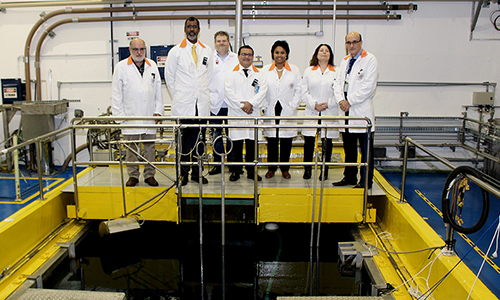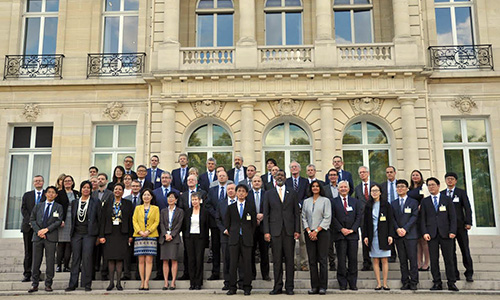Feature
The Nuclear Energy Agency (NEA)
The Nuclear Energy Agency (NEA) is a specialised agency within the Organisation for Economic Co-operation and Development (OECD), an intergovernmental organisation of industrialised countries, based in Paris, France. More »
Press releases and news
 New report and webinar on the supply of medical radioisotopes
New report and webinar on the supply of medical radioisotopes
The NEA hosted a webinar on 18 November 2019 to present findings from a new report on the supply of medical radioisotopes, jointly produced with the Organisation for Economic Co-operation and Development (OECD) Health Committee. Technetium-99m (Tc-99m) is the most commonly used medical radioisotope, essential for 85% of the nuclear medicine diagnostic scans performed worldwide. There are no comparable substitutes available for diagnoses of various cancers and for a range of diagnostics in children. Unfortunately, the global supply of Tc-99m is not technically and economically robust, and the existing supply-chain continues to experience chronic shortages. This new study analyses the current market structure and identifies barriers for the implementation of full cost recovery. If you missed the event, download the report and watch the webinar recording here: oe.cd/nea-med-rad-webinar-2019.
 NEA Director-General visits Brazil to discuss further enhancements to co-operation
NEA Director-General visits Brazil to discuss further enhancements to co-operation
NEA Director‑General Mr William D. Magwood, IV and senior staff visited Brazil on 4‑8 November 2019 for a series of meetings with various ministries and institutions, the Ministry of Mines and Energy (MME), the Ministry of Science, Technology, Innovation and Communication (MCTIC), the Ministry of Foreign Affairs (MRE), the Institutional Security Cabinet, and the National Nuclear Energy Commission (CNEN). Technical visits were also made to the Angra Nuclear Power Plant, the Nuclear and Energy Research Institute (IPEN), and the São Paulo Naval Technology Centre (CTMSP). While in Brazil, Director‑General Magwood gave a lecture on the current state and future prospects for nuclear energy to students and faculty at the University of São Paulo. The Director‑General's visit to Brazil was an excellent opportunity to exchange views on nuclear power, education and research, as well as on how to continue strengthening the NEA's engagement with Brazilian entities.
 NEA Steering Committee for Nuclear Energy
NEA Steering Committee for Nuclear Energy
On 25‑26 October 2019, the NEA held the biannual meeting of the Steering Committee for Nuclear Energy, the highest decision making body at the NEA in which all 33 member countries are represented. The committee is primarily made up of senior officials from national atomic energy authorities and associated ministries. It oversees and shapes the work of the Agency to ensure its responsiveness to member countries' needs. Among the highlights of the October meeting was a discussion on NEA considerations on nuclear technology evolution. The Committee heard about the NEA's progress in establishing the Global Council of Universities on Nuclear Energy Technology Policy and Education, in which leading universities from around the world will engage important human capital issues and other long‑term challenges. Mrs Anne Lazar‑Sury (France) and Mr James R. Warden (United States) were designated as new Vice‑Chairs to the Bureau of the Committee to support Chair Dr Marta Žiaková (Slovak Republic). The meeting agenda also included a presentation on the recent NEA Workshop on Stakeholder Involvement: Risk Communication – Dialogues towards a Shared Understanding of Radiological Risks. The meeting continued with a Policy Briefing on Small Modular Reactors (SMRs).
 Advancing international co‑operation on radioactive waste disposal
Advancing international co‑operation on radioactive waste disposal
Policymakers from fifteen countries met in Paris on 14 October 2019 to discuss the role of government in international co‑operation on advancing the development of national radioactive waste disposal programmes. The first Roundtable for International Co‑operation in Final Disposal of High‑level Radioactive Waste and Spent Fuel was jointly organised by the NEA, the Ministry of Economy, Trade, and Industry (METI) of Japan, and the United States Department of Energy (US DOE). During his opening remarks, Director‑General Magwood noted that international co‑operation can help achieve national solutions through the exchange of information and co‑ordination of policies, and by developing a consensus on international standards. "There have been intensive technical and scientific collaborations over the years," he said. "However, international dialogues at the strategic and policy levels can help further facilitate the exchange of existing approaches, both in the implementation of the HLW management policies, programmes and in regulatory oversight." Read more
NEA International Mentoring Workshop in Science and Engineering
Building on five previous successful events organised in Japan and Spain to encourage female students to pursue STEM, the latest NEA International Mentoring Workshop in Science and Engineering was held on 2 October 2019 in Moscow, Russia. The event was organised in collaboration with Rosatom Global and hosted at the National Research Nuclear University "MEPhI". It brought together 40 female university students from Russia with four highly accomplished women mentors, including the NEA's Tatiana Ivanova, Head of the Division of Nuclear Science, and Laurie Swami, President and CEO of Canada's Nuclear Waste Management Organization (NWMO). The workshop featured opening remarks and a presentation on the NEA‑led initiative by Ms Yeonhee Hah, NEA Head of the Division of Radiological Protection and Human Aspects of Nuclear Safety, who encouraged the participants to consider careers as STEMinists working in science and engineering. The NEA series of mentoring workshops provide the participating students with a rare opportunity to interact with accomplished women scientists and engineers from NEA member countries. The NEA encourages its membership to explore ways of attracting, recruiting and retaining women in science and technology.
 International criticality safety benchmark evaluation project (ICSBEP)
International criticality safety benchmark evaluation project (ICSBEP)
The 2019 edition of the International Handbook of Evaluated Criticality Safety Benchmark Experiments contains criticality safety benchmark specifications that have been derived from experiments performed at various critical facilities around the world. It presents evaluated criticality safety benchmark data in nine volumes that span over 70 000 pages. The handbook contains 574 evaluations with benchmark specifications for 4 973 critical, near‑critical or subcritical configurations, 45 criticality alarm placement/shielding configurations with multiple dose points for each, and 237 configurations that have been categorised as fundamental physics measurements that are relevant to criticality safety applications. Requests to obtain the DVD or online access should be made by completing the online form.
New publications and reports
Country-Specific
Safety Culture Forum: Finland
Read the report
Legal Frameworks
for Long-Term
Operation of Nuclear
Power Reactors
Read the report
The Supply of Medical Radioisotopes: An Economic Diagnosis and Possible Solutions
Read the report
Insights from Leaders
in Nuclear Energy 2:
Leadership for Safety
Read the issue
 What is the NEA?
What is the NEA?
